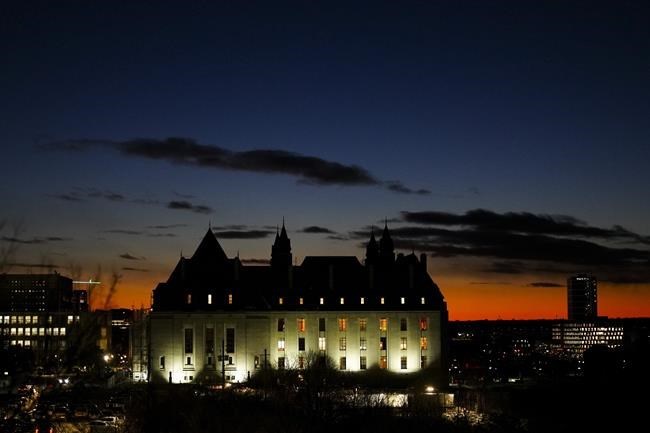
The Supreme Court of Canada says it won't hear from a group of Indigenous elders who were seeking to have input on the possibility of unmarked graves at the site of a Montreal university expansion projects. The Supreme Court of Canada is pictured at sunset in Ottawa on Wednesday, Dec. 13, 2023. THE CANADIAN PRESS/Sean Kilpatrick
Republished January 16, 2025 - 2:40 PM
Original Publication Date January 16, 2025 - 8:11 AM
MONTREAL - The Supreme Court of Canada has refused to hear an appeal from Indigenous elders who were seeking greater oversight over a university construction site in Montreal where they suspect unmarked graves of children are located.
An application for leave to appeal was dismissed Thursday by the country's highest court, which gave no reason for its decision, as is custom.
The group called Mohawk Mothers alleges there are bodies of Indigenous child patients buried on and around the grounds of the former Royal Victoria Hospital, which has been vacant since 2015 and which McGill University is renovating to transform into a new research and teaching hub.
The group said their claims stem from interviews with survivors of mind-control experiments that took place in the 1950s and 1960s at a psychiatric clinic called the Allan Memorial Institute, which was affiliated with the hospital. Canada and the United States funded abusive psychological experiments on vulnerable patients under the MK-ULTRA program, which included experimental drugs, rounds of electroshocks and sleep deprivation.
The Mohawk Mothers said they weren't surprised with the dismissal. "This announcement stemming from the very same colonial legal system that enabled our genocide comes as no surprise to us as Indigenous people," they said in a written statement.
"Even though Canada and Quebec promised us truth and reconciliation, we are still unable to have their courts acknowledge our most basic rights, including the right to investigate crimes committed against our ancestors."
McGill University has said that no unmarked graves or human remains have been discovered on the site.
The Mohawk Mothers group said they will consider their options.
In 2022 the group sued McGill and the provincial body that supports infrastructure projects — Société québécoise des infrastructures, or SQI — and obtained an injunction ordering a pause on the university expansion. As a result, the parties negotiated an agreement in 2023 for a panel of archeologists to oversee the renovations and monitor for the possibility of graves. Cultural monitors were also present in the event graves were found.
But following a conflict on the terms of the deal, the Mohawk Mothers group returned to court and obtained a safeguard order in November 2023 forcing the parties to abide by the agreement. However, the Quebec Court of Appeal overturned that ruling in August 2024, calling the agreement unenforceable and vague, a decision that led the Mohawk group to seek leave to appeal at the Supreme Court.
The Mohawk Mothers said a limited part of the site has been investigated and dogs have detected the scent of human remains in three areas. They said one of those areas has been destroyed by construction equipment.
"We are extremely concerned that the same will happen with the two remaining areas of concern if there is no legal recourse to prevent McGill and the SQI from further destruction of evidence," the Mohawk Mothers said.
In a statement, the public infrastructure body said it has always acted in good faith.
"The SQI has always expressed its desire to shed light, in a spirit of collaboration, on allegations of the presence of graves," said Anne-Marie Gagnon, a spokeswoman for the agency. "The SQI and its partners are committed, in good faith and rigorously, to conducting and continuing archeological research accompanied by experts in the field."
McGill University did not respond to a request for comment on Thursday.
This report by The Canadian Press was first published Jan. 16, 2025.
News from © The Canadian Press, 2025